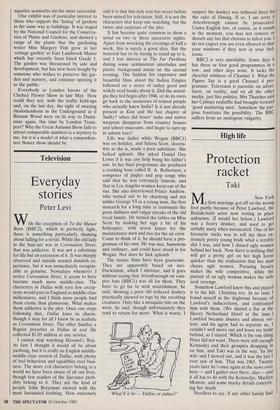Television
Everyday stories
Peter Levi
With the exception of To the Manor Born (BBC2), which is perfectly light, there is something particularly shaming about falling for a serial. While the old lady in the hair-net was in Coronation Street, that was addictive. It was not a substitute for life but an extension of it. It was sharply observed and outside normal donnish ex- perience, but it was immediately recognis- able as genuine. Nowadays whenever I notice Coronation Street, it seems to have become much more middle-class. The characters in Dallas with very few excep- tions would pass in England as middle-class millionaires, and I think more people find them exotic than glamorous. What makes them addictive is the plot. Once one stops following that, Dallas loses its charm, though it may for all I know be as realistic as Coronation Street. The other Sunday a Baptist preacher in Dallas in real life collected $1.05 million at one service.
I cannot stop watching Howard's Way. At first I thought it would all be about yachting, but it is really an English middle- middle-class version of Dallas, with plenty of bad behaviour and squabbles over busi- ness. The more evil characters belong to a world we have been aware of all our lives, though few readers of the Spectator prob- ably belong to it. They are the kind of people John Betjeman viewed with the most fascinated loathing. How extremely odd it is that this rich vein has never before been mined for television. Still, it is not the characters that keep one watching, but the twists and surprises of the plot, It has become quite common to show a serial on two or three successive nights. Apart from wrecking the evenings of half a week, this is surely a good idea. But the material has to be strong to stand up to it, and I lost interest in The Far Pavilions during some sentimental interludes and plastic background music on the second evening. The fashion for expensive and beautiful films about the Indian Empire followed on a series of rather good and widely read books about it. Did the nostal- gia they fed begin after 1946, or do its roots go back to the memories of retired people who actually knew India? Is it not already present in Kim and the last chapter of Stalky? when did boars' tusks and native weapons disappear from country houses and school museums, and begin to turn up in saloon bars?
Life was duller while Wogan (BBC1) was on holiday, and Selena Scott, decora- tive as she is, made a poor substitute. She lacked aplomb. She asked Daniel Day Lewis if it was any help being his father's son. In her final programme she produced a crashing bore called B. A. Robertson, a composer of jingles and pop songs who said that he was extremely famous, and that in Los Angeles women keep out of the sun. She also interviewed Prince Andrew, who turned out to be charming and not unlike George VI as a young man, the first monarch for a long time to transmute the gross dullness and vulgar streaks of the old royal family. He turned the tables on Miss Scott by making her sign a bit of his helicopter, with seven kisses for the maintenance men and two for the air crew. Come to think of it, he should have a pro- gramme of his own. He was nice, humorous and ordinary, and could have stood in for Wogan. Nor does he lack aplomb.
The nature films have been gruesome. They are apparently based on neo- Darwinism, which I mistrust, and it goes without 'saying that Attenborough on vam- pire bats (BBC1) was all for them. They have to go far to seek nourishment, he said, showing a poor old tethered donkey practically chewed to rags by the revolting creatures. Only like a mosquito bite on the wrist, he said, though unfortunately they tend to return for more. What is worse, I 'What'll it be — Dallas or palace?' suspect the donkey was tethered there for the sake of filming. If so, I am sorry if Attenborough cannot be prosecuted. Under English law, of course, as it stands at the moment, you may not remove or disturb any bat that chooses to infest you. I do not expect you are even allowed to shut your windows if they nest in your bed- room.
BBC2 is very unreliable. Some days it has three or four good programmes in a row, and other days none. It lacks the cheerful wildness of Channel 4. What the Papers Say is a good Channel 4 pro- gramme. Television is parasitic on adver- tisers, on reality, and on all the other media, just like politics. Mrs Thatcher said her Cabinet reshuffle had brought forward 'good marketing men'. Somehow the pur- pose frustrates the possibility. The BBC suffers from an analogous vulgarity.


















































 Previous page
Previous page